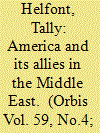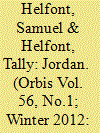|
|
|
Sort Order |
|
|
|
Items / Page
|
|
|
|
|
|
|
| Srl | Item |
| 1 |
ID:
143270


|
|
|
|
|
| Summary/Abstract |
Much has been said about a perceived steady decline of U.S. influence in the Middle East, and American weakness in the world more generally. Though there is some truth to the assertion that the United States’ ability to project power and assert influence in the Middle East has waned since it first sent occupying forces to the region in response to the attacks of 9/11, this does not necessarily equate to a black-and-white dichotomy of former might and current powerlessness. America's activities in Iraq in particular have led to some second and third order consequences that it will be dealing with for some time. While the empowerment of Iran is likely the most dominant negative consequence to emerge from America's activist foray into the region, the galvanizing of a strong pro-Western geopolitical alliance bloc poised to confront Iran and other subversive actors in the region is surely its most positive consequence. As this article will demonstrate, the ability of the United States to capitalize on opportunities created by the latter development have improved its strategic position in the region, and its maneuverability within it beyond what many have acknowledged.
|
|
|
|
|
|
|
|
|
|
|
|
|
|
|
|
| 2 |
ID:
096585


|
|
|
|
|
| Publication |
2010.
|
| Summary/Abstract |
In December 2009, Egypt began construction of an underground steel wall on its border with Gaza in a move designed to halt the smuggling of illegal weapons and other contraband via the Hamas-run underground tunnel network. Egypt's initiative, which is being carried out in the name of its own strategic-national interests, has been the subject of intense criticism throughout the region. This article examines the emergence of a new alignment in the Middle East, based upon a new fault line between moderates and radicals. This alignment is manifested in Egypt's construction of its underground steel wall. By exploring the motivations, responses, and implications of building such a wall, it will become apparent that two camps have emerged in the region on this issue and that their stances are but an illustration of the aforementioned shift.
|
|
|
|
|
|
|
|
|
|
|
|
|
|
|
|
| 3 |
ID:
110160


|
|
|
|
|
| Publication |
2012.
|
| Summary/Abstract |
The Arab Spring has fundamentally shifted the strategic balance in the Middle East. As all sides rush to ensure that their interests will be secured, the Hashemite Kingdom of Jordan has emerged as a key battleground between those who would like to see a more democratic region, and those who would like to maintain economic stability. On one side of this debate is the Gulf Cooperation Council, led by Saudi Arabia, that views democratic reform as a threat to economic stability. On the other side are the forces of the Arab Spring, which have called for political reform in states such as Egypt, Syria, and Libya, even if these reforms come at the expense of stability. This article examines the various forces, both domestic and international, that are attempting to influence Jordan, and through it, the balance of power in the Arab World.
The uprisings in the Arab world have not only upended domestic politics in individual states where protests have taken place, they have also served as a catalyst for transforming international relations in the Middle East. The Arab Spring has sent policymakers on all sides scrambling to ensure that the new regional order will be in line with their interests. The regimes that fell in Egypt and Tunisia were pillars of a moderate Sunni bloc that was allied with the United States and felt threatened by both Iran's bid for regional hegemony as well as Islamist and/or democratic reform movements domestically. The leaders of this moderate Sunni bloc, which also includes Saudi Arabia, the Gulf States, and Jordan, were alarmed by American support for the protest movements that ousted the Mubarak and Ben Ali regimes from Egypt and Tunisia respectively. The remaining states in this bloc have since circled their wagons, and are working to build a durable political/military alliance that is capable of withstanding the destabilizing trends associated with the Arab Spring.
However, unlike the wealthy Gulf Arab states, which now form the core of this truncated bloc, Jordan is poor and has always been more culturally and politically tied to the states of the Mediterranean Basin. Thus, the pull of the Arab Spring, which engulfed Egypt, Syria, and other Mediterranean states, has been much stronger in Jordan than it has in most of the Gulf Arab States (the major exception being Bahrain). Jordan, therefore, finds itself caught between two competing forces. On one side are the Sunni Monarchies of the Gulf, which wish to maintain regional economic and political stability and have attempted to bolster the Jordanian regime by recently inviting it to join the Gulf Cooperation Council (GCC). The other side presents pressures of political reform associated with the Arab Spring that have spread throughout the Mediterranean Basin. As an unexpected result, the small Arab Kingdom of Jordan has become a strategic battleground between those who want to see a more democratic region, and those who want to maintain the status quo. Nevertheless, the domestic politics of Jordan will undoubtedly decide in which direction Jordan heads. Political divisions inside Jordan have thus suddenly become very important to the future of the whole region.
|
|
|
|
|
|
|
|
|
|
|
|
|
|
|
|
| 4 |
ID:
162747


|
|
|
|
|
| Summary/Abstract |
Though a vast coalition of some 75 countries has retaken much of the territory once comprising ISIS's Caliphate, the threat to the Fertile Crescent is far from over. Saudi Arabia, the United Arab Emirates, and a number of the other Gulf States represent a few of the many regional and global stakeholders currently engaged in this arena in the name of stability and other more personal interests. This article will explore the motivations, capabilities, and activities of the Gulf States vis-à-vis ISIS, the Fertile Crescent, and the larger threat that groups like ISIS represent more broadly.
|
|
|
|
|
|
|
|
|
|
|
|
|
|
|
|
|
|
|
|
|